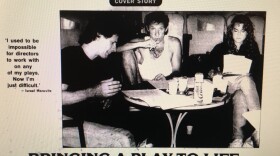
Rhaina Cohen
Rhaina Cohen is a producer and editor for NPR's Enterprise Storytelling unit, working across Embedded, Invisibilia, and Rough Translation.
Previously, she was a producer for Hidden Brain, where she brought together narrative journalism and social science research. Some of the most rewarding stories she worked on include those about why the #MeToo movement took off when it did, how American masculinity makes it harder for men to build close friendships and why we sometimes make decisions that baffle us. Cohen joined NPR as an intern for Planet Money.
She periodically writes for outlets such as The Atlantic, The Washington Post, and The New Republic. Her article about people who make a friend their life partner was selected by Longreads as one of the best articles of 2020. She received some of her earliest journalism training as a research assistant for authors. She worked on the New York Times bestselling book All The Single Ladies: Unmarried Women and the Rise of an Independent Nation and the biography Michelle Obama: A Life.
Cohen was a Marshall Scholar at Oxford, where she earned a master's in comparative social policy (and while there, competed in a dance style that hasn't yet taken off in the United States: acrobatic rock 'n' roll). She holds a bachelor's degree in American Studies from Northwestern University. As a 2018 FASPE fellow, she studied journalism ethics in Germany and Poland.
-
There's a core belief embedded in the story of the United States: the American Dream. The possibility of climbing the economic ladder is central to that dream. This week we speak with Raj Chetty, one of the most influential economists alive today, about the state of economic mobility in the U.S. and whether the notion of the American Dream is still useful. For more information about the research in this episode, visit https://n.pr/2z8cvSs.
-
We're used to the idea that rhetoric sways voters. But what about another element of language: a candidate's voice? This week on Hidden Brain, what happens when our political system and ancient biological rules meet. For more information about the research in this episode, visit https://n.pr/2Pe1Fog.
-
Latest Trend: U.S. Companies Are Engaged In Stock BuybacksCompanies flush with cash are choosing to use some of that money to buy back their own stock shares, instead of investing in new products or raises for employees. So, is this a good trend?
-
You've certainly heard some variation of the phrase "be a man." But what does that even mean? This week, we question our existing definitions of masculinity. We'll meet a man who works in a field traditionally considered "women's work." And we'll hear from a researcher who says manhood is "hard to earn and easy to lose."
-
Companies are buying back stock from shareholders more than ever. Not everyone thinks that's a good thing.
-
After a disaster happens, we want to know whether something could have been done to avoid it. Did anyone see this coming? Many times, the answer is yes. So why didn't the warnings lead to action? This week, we explore the psychology of warnings with a visit to a smelly Alaskan tunnel, a gory (and fictional) murder plot, and even some ABBA.
-
Decades ago, a group of women accused a prominent playwright of sexual misconduct. For the most part, the complaints went nowhere. In 2017, more women came forward. This time, people listened.
-
This week on the Hidden Brain radio show, we explore how the constantly evolving nature of languages can give us different ways of understanding ourselves as well as the world we live in.
-
Fake news in the U.S. is as old as American journalism itself. We explore the trade-offs journalists have long faced between elitism and populism, and integrity and profit.
-
As many as 40 percent of students who intend to go to college don't show up in the fall. Education researchers call this phenomenon "summer melt," and it has long been a puzzling problem.








